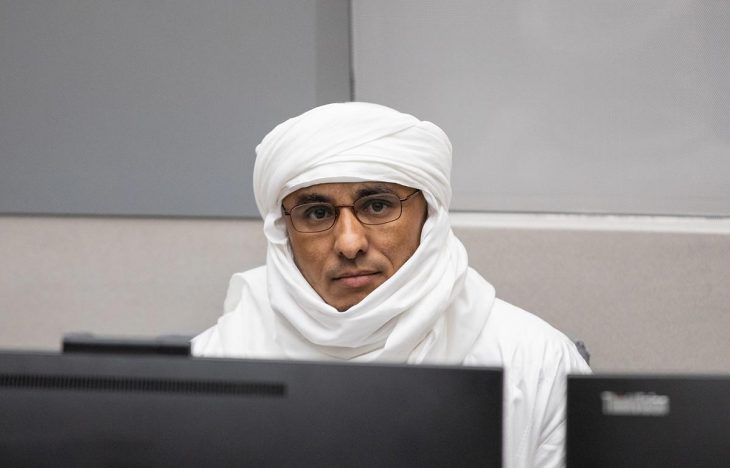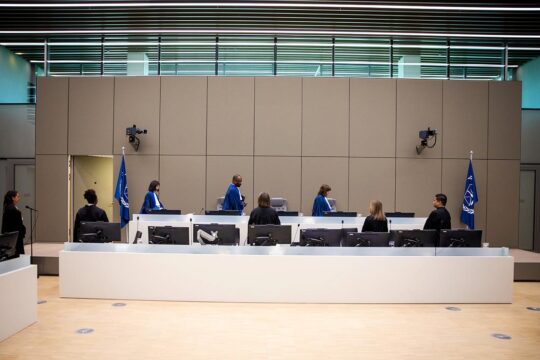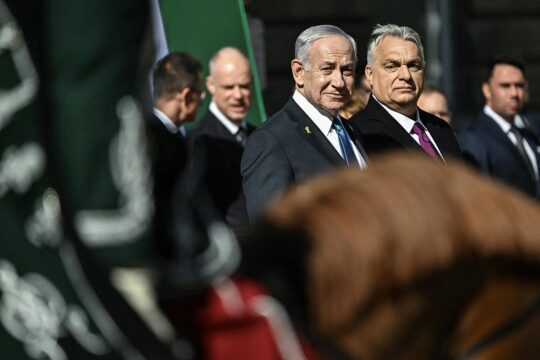In the Malian capital Bamako, reactions to the name of Al Hassan Ag Abdoul Aziz Ag Mohamed Ag Mahmoud go from a slight silence to an expression that seems to say "Al Hassan who?". The trial of this man alleged to have been head of the Islamic police in Timbuktu eight years ago has been ongoing since last July, some 6,500 km away at the International Criminal Court (ICC) in The Hague, Netherlands.
For several weeks now, national media attention has been focused on politics and the transition resulting from the military coup that took place last August. But even before this particular period for the country, the local press were already showing little interest in the trial, much to the displeasure of human rights defenders. Few people in Bamako know about "Al Hassan". However, 1,000 km to the north, in the city of Timbuktu, he is known to all. According to the ICC, he is suspected of having committed war crimes and crimes against humanity during the occupation of the city by jihadists, between April 1, 2012 and January 28, 2013. He was allegedly a member of Ansar Eddine, a Salafist jihadist armed group, and de facto commissioner of the Islamic police. He was also allegedly associated with the work of the Islamic Tribunal in Timbuktu and is suspected of having participated in the execution of its decisions.
In Timbuktu, fear and silence
In Timbuktu, the "Pearl of the Desert", most people will only talk about the "Al Hassan" trial under condition of anonymity. Fear of reprisals prevents tongues from loosening, and the wounds of those sinister months of Islamic law remain deep. The 43-year-old former "commissioner of terror" came from a village about 20 km from Timbuktu. His family and relatives are in town, and much of the population keeps mum so they cannot be identified by them. Several years after the events, the inhabitants still live under the weight of an omerta, for their own safety.
Yet some have decided to break this pact of fear. Yehia Ahma Cissé, for example, decided to fight the battle head-on. In 2012, his eldest son was killed by jihadists. Since then, wounded in his flesh, he has been fighting for "justice". He is the president of a co-ordinating body grouping several associations of victims, "eight in the city of Timbuktu alone," he says. He says the coordination has not yet been contacted to provide testimonies, even though he acknowledges that some people are afraid to do so. "We have people who are willing to testify; I am one of them," he says. But given the fear and the illiteracy of many victims, the human rights associations have a hard time convincing them. "Given the fragile situation, it goes without saying that the victims are afraid," explains Drissa Traoré, coordinator of a joint project between the Malian Association for Human Rights (AMDH) and the International Federation for Human Rights (FIDH). Through this initiative, a Malian lawyer has been appointed to be one of the legal representatives of the victims during the trial.
Internet is a luxury
However, the "Al Hassan" trial remains very little followed. The ICC has put in place a mechanism to make it accessible to Malians. The Court's Public Information and Outreach Section, with the support of the ICC office in Mali, organized training for the media and civil society. "The section has produced and will continue to produce throughout the trial ready-to-air television and radio programmes entitled ‘In the Courtroom’, providing a summary of the proceedings before the Court; background documents; audio recordings with answers to the most frequently asked questions by Malian partners; and publications on the ICC's various social networks," explains ICC spokesperson Fadi El Abdallah. Some local media, including Fondation Hirondelle's radio programme Studio Tamani, are using them to cover the trial. But these contents do not appear in the main media, such as the national radio ORTM 1.
The hearings are also broadcast online with a 30-minute delay. But in Timbuktu, a good Internet connection is a luxury and the population has difficulty following the trial. They get more information from a journalist in the region who has covered some of the hearings in The Hague, has written articles on the subject, and hosts a programme in Songhoy, one of the local languages.
A simple “executor”
The relative lack of interest in the trial can also be explained, for people in Timbuktu, by the profile of the accused. Even if the charges against "Al Hassan" are serious, he remains perceived as a simple "executor". After the trial of Ahmad Al Faqi Al Mahdi, sentenced to nine years in jail by the ICC in 2016 after pleading guilty to the destruction of mausoleums, the trial of Al Hassan, transferred to The Hague two years later, has a bitter taste. "The population does not feel a link with the Court, this trial is only a settling of scores,” says a civil society leader. “Westerners have a grudge against some jihadists, otherwise the leaders of Al Hassan have been released."
Houka Houka Ag Alhousseini, an Islamic judge arrested by the Malian army in 2014, was released in August of the same year, following negotiations between the Malian government and armed groups in the north. He now lives in a place near the city of Timbuktu, where he is a "Koranic master". "He is completely free, and after all he has done, it is an insult to the victims," says a local human rights leader. While in Bamako in September 2019 for the launch of a political movement, Houka Houka denied the facts for which he was accused by the population, claiming that he had not ordered any "amputation" or "execution". Eager to see all those responsible before a judge, the Coordination of Victims, through its president, nevertheless still hopes that the Al Hassan trial will result in "justice being rendered and the victims compensated”.






